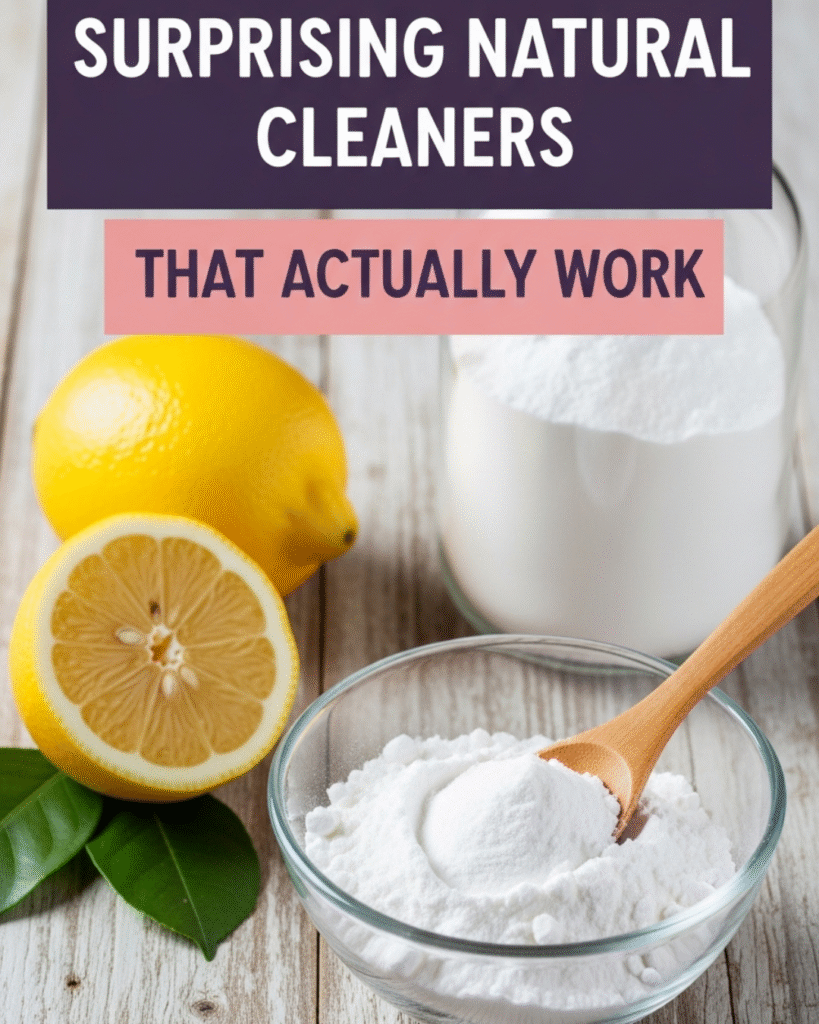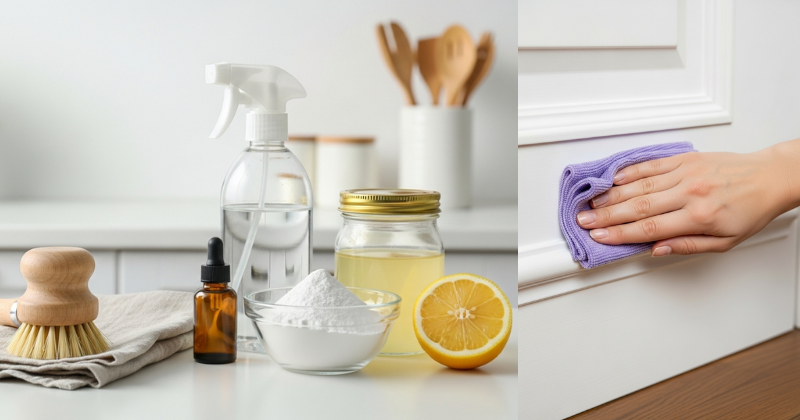Are you looking to ditch harsh chemicals and toxic fumes without sacrificing a spotless clean? Many people assume that effective cleaning requires synthetic ingredients, but the truth is your pantry holds some of the most powerful and surprising natural cleaners that actually work! From tackling tough grease to disinfecting surfaces, simple, everyday household items can transform your cleaning routine, saving you money and protecting your health. This comprehensive guide will discover accessible, achievable DIY methods using unexpected ingredients. We’ll show you how to achieve a sparkling, chemical-free home using natural products you already trust.

🍋 Foundation First: Why Go Natural With Your Cleaning?
The move toward natural cleaners is motivated by more than just trendiness; it’s a commitment to a healthier, more sustainable home environment. Understanding the basic science behind these natural powerhouses builds confidence and makes the switch easy.
H3: The Power Trio: Vinegar, Baking Soda, and Salt
While we’ll explore the surprising cleaners in later sections, the foundation of almost all effective DIY cleaning relies on these three classics.
- White Vinegar (The Acid): Vinegar is mostly acetic acid, which breaks down mineral deposits (like hard water stains and soap scum) and dissolves sticky grease. Its low $\text{pH}$ makes it a potent natural disinfectant.
- Baking Soda (The Abrasive & Deodorizer): Sodium bicarbonate is a gentle abrasive that scrubs grime without scratching surfaces. As a base, it neutralizes odors and reacts powerfully with acids (like vinegar) to lift stuck-on messes.
- Coarse Salt (The Scrubber): Cheap and effective, salt provides the friction needed to scour tough residues on pots, cutting boards, and oven surfaces.
H3: Addressing Common Hesitations
Many people hesitate to switch, worrying that natural options aren’t strong enough. We’re here to encourage you! Natural cleaners aren’t less effective; they simply work differently. They rely on chemical reactions, friction, and soak time rather than caustic melting. A little patience and soak time often yield results that far surpass expensive store-bought products.
🍚 Surprising Natural Cleaners That Actually Work: The Hidden Gems
Beyond the power trio, several everyday items offer astonishing cleaning capabilities that can handle some of the toughest jobs around the house. These truly are the surprising natural cleaners that actually work.
Core Methods: Unleashing Unexpected Cleaning Power
- Cream of Tartar (The Stainless Steel Savior):
- The Science: Cream of Tartar (potassium bitartrate) is a mild acid that reacts with mineral stains and rust, making it a fantastic, gentle polish.
- The Application: Mix 1 part Cream of Tartar with 1 part White Vinegar to create a paste. Apply to stained stainless steel pots, appliances, or sink fixtures. Let it sit for 5-10 minutes, then scrub gently and rinse. Watch as tarnish and discoloration disappear, leaving a brilliant shine.
- Ketchup (The Copper and Brass Brightener):
- The Science: Ketchup contains both salt (abrasive) and acetic acid (from vinegar). This combination is highly effective at dissolving the oxidation (tarnish) that dulls copper and brass.
- The Application: Rub a generous layer of ketchup directly onto tarnished copper pots, jewelry, or brass items. Leave the ketchup to sit for 15-30 minutes. The acid does the hard work! Wipe off the ketchup and buff dry with a soft cloth for a restored, warm shine.
- Vodka (The Streak-Free Glass Cleaner):
- The Science: High-proof alcohol, like inexpensive vodka, evaporates rapidly and contains no soap or detergents that leave streaks. It’s a natural solvent that easily cuts through oils and fingerprints.
- The Application: Mix 1 part cheap vodka with 2 parts distilled water in a spray bottle. Add a few drops of peppermint essential oil for scent, if desired. Use this mixture to clean windows, mirrors, and glass stovetops for a truly streak-free finish that beats most commercial glass cleaners.
- Used Coffee Grounds (The Drain Deodorizer and Scrubber):
- The Science: Coffee grounds are mildly abrasive and, more importantly, are great at absorbing and neutralizing smells.
- The Application: Pour used, wet coffee grounds followed by a pot of boiling water down your kitchen drain once a week. The abrasive texture helps scrub away residue inside the pipe, and the coffee neutralizes lingering odors from food particles.
💧 Advanced Strategies: Customizing and Enhancing Natural Solutions
You can easily amplify the effectiveness and convenience of your surprising natural cleaners by creating simple, customized DIY formulas. This emphasizes the cost-saving benefits and satisfaction of creation.
H3: Creating a Multipurpose Citrus-Enzyme Cleaner
This proactive strategy allows you to turn food scraps (citrus peels) into a long-lasting, multipurpose cleaner.
- The Formula: Fill a large jar halfway with citrus peels (orange, lemon, grapefruit) and then fill the rest of the jar with white vinegar.
- The Magic: Seal the jar and let it sit in a cool, dark place for 2 to 4 weeks. The acid in the vinegar extracts the D-limonene (a powerful degreaser) from the citrus oils.
- The Finish: Strain the liquid, discarding the peels. Dilute the citrus-enzyme cleaner 1:1 with distilled water for an all-purpose spray that cuts grease, shines surfaces, and smells incredible.
H3: Beyond the Mop: Advanced Floor Cleaning
For non-waxed floors like tile, stone, and sealed hardwood, traditional cleaners often leave behind a sticky residue.
- The Solution: Use a solution of 1 gallon of warm water, 1/2 cup of white vinegar, and 10 drops of Lemon or Pine Essential Oil. The vinegar sanitizes and cuts through film, while the essential oil acts as a solvent and leaves a fresh scent. For deep cleaning grout, apply a baking soda paste directly to the grout, spray it with the citrus-enzyme vinegar solution, let it bubble, and scrub with a stiff brush.
🛑 Troubleshooting and Safety: Maximizing Effectiveness
While natural cleaners are generally safer than harsh chemicals, knowing where not to use them and how to address tough stains is essential for maintaining your home’s integrity.
Featured Snippet Potential: “Can I use vinegar or lemon juice to clean all my surfaces?”
No, you should not use vinegar or lemon juice (acidic cleaners) on all surfaces. While excellent for general cleaning, acid can damage certain porous materials. Avoid using vinegar or lemon juice on natural stone surfaces like granite, marble, or travertine, as the acid can etch the sealant and pit the stone. Also, avoid using vinegar on cast iron, unsealed grout, or very old wood finishes. For these surfaces, use a gentle solution of Castile soap and water instead.
Safety Considerations and Surface Guardrails
| Cleaner | Surfaces to Avoid | Reason for Caution |
| Vinegar / Lemon Juice | Granite, Marble, Natural Stone, Cast Iron, Unsealed Grout | Acid etches and pits soft stone and removes seasoning on cast iron. |
| Baking Soda Paste | Fiberglass, highly polished surfaces, non-stick coatings | While gentle, overuse or aggressive scrubbing can cause tiny scratches. |
| Boiling Water (for Drains) | PVC pipes (rarely), Porcelain toilets (sudden temperature changes) | Extreme temperature shifts can crack porcelain or soften old, weak pipes. Use warm, not scalding, water. |
✅ Maximizing Results: Creating a Sustainable Cleaning System
The true benefit of switching to surprising natural cleaners that actually work is the creation of a streamlined, sustainable, and powerful cleaning ecosystem that saves time and money.
Long-Term Habits for a Cleaner Home
- The Weekly Reset: Commit to making a fresh batch of your citrus-enzyme cleaner once a month. This ensures you always have a non-toxic, potent spray ready for daily wipe-downs.
- Microfiber Power: Complement your natural solutions with high-quality microfiber cloths. Microfiber mechanically lifts up to $\text{99\%}$ of bacteria and dirt with just water, reducing the need for strong chemical agents. This allows your simple vinegar or vodka sprays to work even more effectively.
- Sustained Success: Remember that consistency is key with natural cleaning. Wiping down surfaces with a vinegar solution regularly prevents the buildup of hard water and grime, meaning you rarely have to break out the heavy-duty commercial scrubbers again. This sustainable lifestyle change is an empowering achievement.
💡 Conclusion: Unlock Your Home’s Natural Cleaning Potential
You are now equipped with the knowledge to transform your home cleaning routine using powerful, budget-friendly, and surprising natural cleaners that actually work. By utilizing simple ingredients like cream of tartar, ketchup, and vodka, alongside the core cleaning trio, you can achieve a sparkling clean without the worry of harsh chemical exposure.
Embrace the self-reliance and cost-saving benefits of DIY cleaning. The satisfaction of a clean, naturally scented home is your reward!
